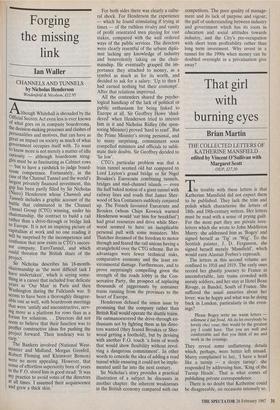Forging the missing link
Ian Waller
CHANNELS AND TUNNELS by Nicholas Henderson Weidenfeld & Nicolson, f12.95 Although Whitehall is shrouded by the Official Secrets Act even less is ever known of what goes on in company boardrooms, the decision-making processes and clashes of Personalities and motives, that can have as great an impact on society as much of what government occupies itself with. To want to know more is not merely a matter of idle curiosity — although boardroom strug- gles must be as fascinating as Cabinet rows — but to have a yardstick to judge board- room competence. Fortunately, in the case of the Channel Tunnel and the world's largest privately financed investment, this gap has been partly filled by Sir Nicholas (Nicco) Henderson whose Channels and Tunnels includes a graphic account of the battle that culminated in the Channel Tunnel Group (CTG) winning, under his chairmanship, the contract to build a rail rather than a drive-through or bridge link to Europe. It is not an inspiring picture of capitalism at work and no one reading it will be surprised by the incompetence and confusion that now exists in CTG's succes- sor company, EuroTunnel, and which could threaten the British share of the project.
Sir Nicholas describes his 18-month- chairmanship as 'the most difficult task I have undertaken', which is saying some- thing in a career that included four delicate years as 'Our Man' in Paris and then Washington during the Falklands war. It seems to have been a thoroughly disagree- able one as well, with boardroom meetings that were 'untidy and unconstructive, serv- ing more as a platform for rows than as a forum for solutions. . . Directors did not seem to believe that their function was to proffer constructive ideas for pushing the project forward. Their tendency was to carp.'
The Bankers involved (National West- minster and Midland, Morgan Grenfell, Robert Fleming and Kleinwort Benson) were no more appealing. However, that sense of effortless superiority born of years in the F.O. stood him in good stead: 'It was my practice to avoid votes of the directors at all times. I assumed their acquiescence and grew a thick skin.' For both sides there was clearly a cultu- ral shock. For Henderson the experience — which he found stimulating if trying at times — of the ruthless rivalry and vanity of profit orientated men playing for vast stakes, compared with the well ordered ways of the public services. The directors were clearly resentful of the urbane diplo- mat lacking any knowledge of industry and benevolently taking on the chair- manship. He eventually grasped the im- portance they attached to money, as a symbol as much as for its worth, and decided to ask for a salary: 'Up to then I had earned nothing but their contempt'. After that relations improved.
All the contenders shared the psycho- logical handicap of the lack of political or public enthusiasm for being linked to Europe at all. Sir Geoffrey Howe 'shud- dered' when Henderson tried to interest him in it and Nicholas Ridley (the spon- soring Minister) proved 'hard to read'. But the Prime Minister's strong personal, and to many surprising, commitment soon compelled ministers and officials to subli- mate their doubts. Sir Geoffrey decided to lie low'.
CTG's particular problem was that a train tunnel seemed old hat compared to Lord Layton's grand bridge or Sir Nigel Broakes's Euroroute combining tunnels, bridges and mid-channel islands — even the half baked notion of a giant tunnel with railway lines and roads that James Sher- wood of Sea Containers suddenly conjured up. The French favoured Euroroute and Broakes (whom Chips Keswick warned Henderson would 'eat him for breakfast') had great resources and drive while Sher- wood seemed to have an inexplicable personal pull with some ministers. Mrs Thatcher dreamed of the freedom to motor through and feared the rail unions having a stranglehold over the CTG scheme. But its advantages were fewer technical risks, comparative economy and the least en- vironmental damage. Furthermore, and to prove surprisingly compelling given the strength of the roads lobby in the Con- servative Party, the prospect of replacing thousands of juggernauts by container trains running from the provinces to the heart of Europe.
Henderson defused the union issue by promising that the company rather than British Rail would operate the shuttle trains. He outmanoeuvered the drive-through en- thusiasts not by fighting them as his direc- tors wanted (they feared Broakes or Sher- wood getting a foothold), but by devising with another F.O. touch 'a form of words that would show flexibility without invol- ving a dangerous commitment'. In other words to concede the idea of adding a road tunnel while ensuring it could not be imple- mented until far into the next century.
Sir Nicholas's story provides a practical illustration of a subject he discusses in another chapter: the inherent weaknesses in the British economy compared with our competitors. The poor quality of manage- ment and its lack of purpose and vigour; the gulf of understanding between industry and government which has its roots in education and social attitudes towards industry, and the City's pre-occupation with short term profitability rather than long term investment. Why invest in a tunnel for the 1990s when money can be doubled overnight in a privatisation give away?


















































 Previous page
Previous page